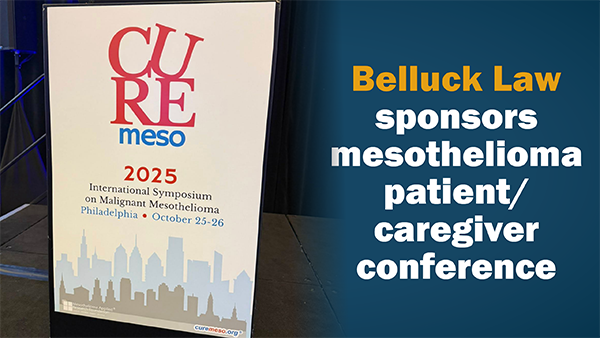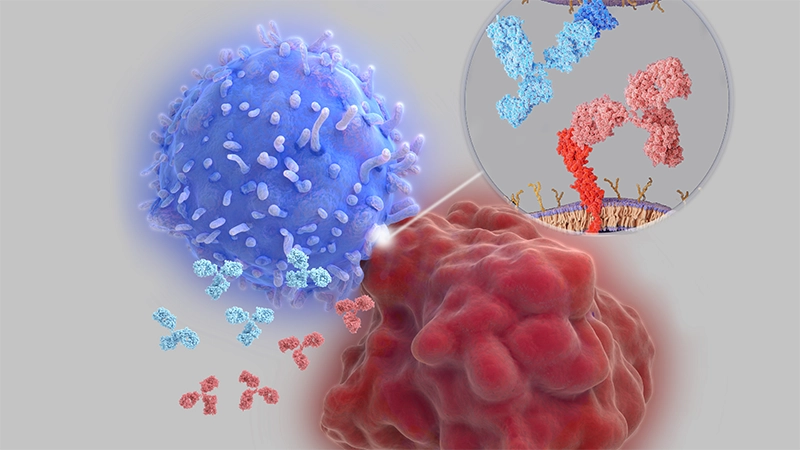Experts, Patients, and Advocates Unite in Philadelphia to Advance Mesothelioma Research

The Mesothelioma Applied Research Foundation hosted its annual International Symposium on Malignant Mesothelioma in Philadelphia, drawing together a vibrant mix of scientists, physicians, patients, and advocates. Over the course of two days, participants shared the latest discoveries in treatment and research while strengthening the community of those affected by mesothelioma.
Collaborative Approaches to Treatment
Pleural Mesothelioma
One of the most anticipated sessions was the Pleural Tumor Board Panel, which showcased how multidisciplinary teams collaborate to create individualized treatment strategies.
Panelists included:
- Melina Marmarelis, MD, University of Pennsylvania
- Adam Bograd, MD, Swedish Cancer Institute
- Mehmet Altan, MD, MD Anderson Cancer Center
- Michael Offin, MD, Memorial Sloan Kettering Cancer Center
The group examined two patient cases, offering attendees a rare inside look at how medical oncologists and surgeons evaluate clinical details, tumor biology, and patient health before deciding on next steps. Although mesothelioma remains a challenging disease with limited approved therapies, the experts agreed that immunotherapy should be considered the first-line treatment for eligible patients, while chemotherapy remains a solid option for those who are not.
Surgery, and specifically pleurectomy decortication, continues to play a role for certain patients with epithelioid cell type and sufficient fitness to endure recovery. Typically, immunotherapy or chemotherapy may be administered before or after surgery to improve outcomes. For sarcomatoid mesothelioma, immunotherapy remains the preferred approach, as surgery offers little benefit. In select cases, surgery can also relieve symptoms such as pain or shortness of breath.
Peritoneal Mesothelioma
The Peritoneal Tumor Board Panel took a similar deep dive into treatment decision-making for patients with peritoneal mesothelioma, featuring:
- Jason Foster, MD, University of Nebraska
- Hedy Kindler, MD, University of Chicago Medicine
- Michael Offin, MD, Memorial Sloan Kettering Cancer Center
- Georgios Karagkounis, MD, Memorial Sloan Kettering Cancer Center
Unlike pleural disease, peritoneal mesothelioma lacks a universal staging system or formal treatment guidelines. However, consensus remains strong around the combination of cytoreductive surgery and HIPEC (hyperthermic intraperitoneal chemotherapy) as the most effective treatment strategy. Systemic chemotherapy and immunotherapy also continue to show promise for select patients.
Looking Ahead: Innovation and Research
Clinical Trials and Targeted Therapies
Dean Fennell, MD, PhD, of the University of Leicester, provided an overview of ongoing and recently completed clinical trials that are reshaping the landscape of mesothelioma treatment. His presentation underscored the growing role of targeted therapies, which match patients to treatments based on the unique molecular characteristics of their tumors—bringing precision medicine closer to reality for the mesothelioma community.
The Promise of Artificial Intelligence
Another highlight came from Kevin Blyth, MD, University of Glasgow, who explored the expanding role of artificial intelligence (AI) in medical imaging. AI, he explained, can help radiologists and clinicians interpret scans more accurately and consistently—an essential step toward improving diagnosis, tracking tumor changes, and refining treatment response assessment.
Empowering the Mesothelioma Community
While scientific updates took center stage, the symposium also served as an important gathering for patients and families. Informal discussions and organized sessions encouraged connection, shared learning, and emotional support.
Key sessions included:
- Legal Q&A Panel, featuring Seth Dymond, Esq., partner at Belluck Law, LLP, who fielded questions about the legal landscape surrounding asbestos exposure and mesothelioma claims.
- Clinical Trials Patient Panel, where participants shared first-hand accounts of their experiences enrolling in studies and managing side effects.
- Survivorship Panel, which explored the physical and emotional journey of recovery after treatment.
The weekend concluded with renewed optimism and a strong sense of community—reflecting the Foundation’s ongoing mission to connect scientific discovery with compassionate care. Recordings of several sessions are now available through the Mesothelioma Applied Research Foundation’s website and YouTube channel.
Belluck Law: Supporting the mesothelioma community in and out of the courtroom
Belluck Law, LLP proudly served as one of the symposium’s top sponsors. The nationally recognized firm has long been dedicated to representing individuals and families affected by asbestos exposure and mesothelioma.
With offices across New York State, including New York City, Albany, Rochester, Woodstock, and Gloversville, as well as in Maine, Massachusetts, and New Jersey, Belluck Law has secured over $1 billion in verdicts and settlements for its clients. Its attorneys have been consistently recognized by Best Lawyers, Super Lawyers, Martindale-Hubbell, and other leading legal evaluators.
In September 2025, the firm achieved two landmark victories: an $83 million verdict for a client exposed to asbestos through clay products, and a $12.25 million verdict for another client whose exposure occurred while living near a talc mine.
The International Symposium on Malignant Mesothelioma once again proved to be more than just a conference. It was a reminder that through collaboration, science, and shared humanity, progress continues for all those affected by this devastating disease.




